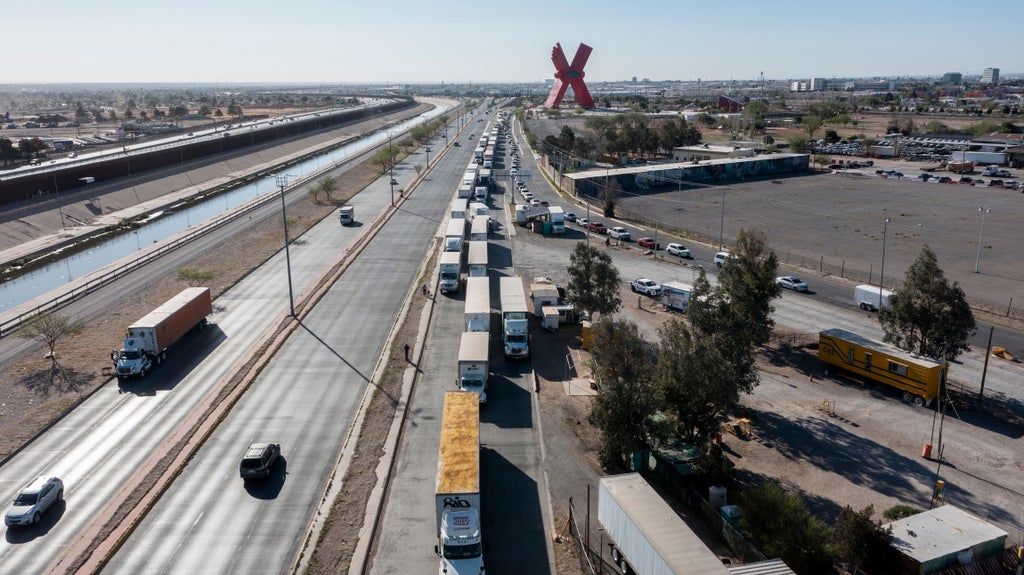
The logjam of trucks at the U.S.-Mexico border finally began breaking Thursday after nearly a week as Texas Gov. Greg Abbott eased off his latest dramatic action over immigration that has gridlocked some of the world's busiest trade ports and taken a mounting economic toll.
“There is a sense of urgency now to reach deals that did not exist before,” Abbott said.
The two-term Republican governor, who for days has allowed commercial trucks to backup for miles into Mexico after requiring them to stop for additional inspections in Texas, lifted that order for bridges in El Paso and other cities after announcing a new security agreement with the neighboring Mexican state of Chihuahua.
It remains not a full repeal of Abbott's policy that he rushed into place April 6 as part of an ongoing fight with the Biden administration over the flow of migrants and drugs. The lengthy extra inspections elsewhere along Texas' 1,200-mile border — including in the busy Rio Grande Valley — will continue until Abbott says similar agreements are reached with other Mexican states.
But the deal with Gov. María Campos Galván of Chihuahua, who joined Abbott for the announcement in the Texas Capitol, sets in motion the biggest relief yet for traffic that has snarled the Texas-Mexico border and raised intensifying warnings of higher prices for U.S. shoppers and spare grocery store shelves.
“People like me who buy millions of dollars of produce a week are starting to curb their purchases toward other regions of the country,” said Brent Erenwert, CEO of Brothers Produce in Houston, which relies heavily on imports from Mexico.
The inspections ordered by Abbott came in response to the Biden administration announcing last month it would wind down a public health law that has limited asylum-seekers in the name of preventing the spread of COVID-19. When that happens, the number of migrants coming to the U.S. is expected to increase.
On Wednesday, Abbott had repealed the inspections at one bridge in Laredo after reaching a similar agreement over security with neighboring Nuevo Leon. Gov. Samuel García of Nuevo Leon said his state would begin checkpoints to assure Abbott they “would not have any trouble.”
Texas Agriculture Commissioner Sid Miller, a Republican who has urged Abbott to walk back the inspections order, said Thursday one major agricultural company told him that 100 trucks sent to Mexico for deliveries have been unable to come back across because of the congestion.
He questioned what the holdout achieved, and in the case of Abbott's agreement with Nuevo Leon, said it did not appear substantive.
“They’re just basically going to leave it up in good faith,” Miller said. “There's no enforcement, no reckoning on that if they don’t."
The White House, the Mexican government, trade groups and reeling businesses have bashed the extra inspections as redundant and a new burden on an already fragile supply chain.
Abbott’s border inspections come at a time when U.S. supply chains are already overwhelmed. A surge in demand from customers — the result of a surprisingly fast recovery from the devastating coronavirus recession of 2020 — caught businesses by surprise and led to bottlenecks at factories, ports and freight yards. It’s also pushed up prices, contributing to the highest inflation in 40 years.
COVID-related factory shutdowns in China and the rocketing cost of shipping goods across the Pacific Ocean have many companies looking to Mexico, where there’s no ocean to cross and there’s relief from the political and trade disputes between Washington and Beijing.
“A lot of companies, right now, they’re looking at Mexico as a way to bypass ocean dependency,’’ said Bindiya Vakil, CEO of the supply chain consultancy Resilnc. “If I’m one of those companies, I’m looking at this new regulation on the Texas border and I’m really concerned because this means additional delays, and that was supposed to be my solution -- to go to Mexico and avoid the ocean altogether.’’
“The border situation is already pretty bad,’’ Bakil said. “Truck drivers spend hours sitting --- six to eight hours -- just waiting at the border.’’ The trucking industry is already struggling to find and keep drivers, she said; more hassles at the U.S.-Mexico border will just make a truck driving less appealing and the jobs harder to fill.
The U.S.-Mexico border is crucial to the U.S. economy. The United States last year imported $390.7 billion worth of goods from Mexico, second only to China. Laredo, Texas, was the busiest U.S. port of entry for trucks last year, processing 1.9 million loaded containers, according to the U.S. Department of Transportation.
The auto industry is especially dependent on cross-border commerce. The U.S. last year imported more auto parts from Mexico ($60.1 billion worth) than it did from the next four countries (Canada, China, Japan and Germany) combined.







